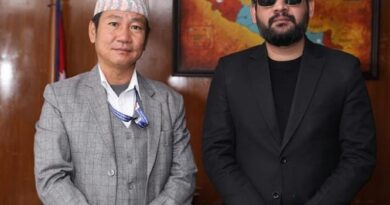Nepal Cricket Star Sandeep Lamichhane Denied US Visa, Sparking Protests
Nepali cricket fans are in an uproar after their star player Sandeep Lamichhane was denied visa by the US embassy in Kathmandu. This rejection comes just weeks after Lamichhane was acquitted of a rape case by the Patan High Court, clearing him to play in the upcoming ICC Men’s T20 World Cup co-hosted by the United States and West Indies.

Lamichhane took to social media to express his disappointment, stating the embassy “did it again” referencing a similar visa denial in 2019. The Cricket Association of Nepal (CAN) had lifted his suspension following the court’s ruling, allowing him to be selected for the World Cup squad.
The US embassy, citing confidentiality of visa records, declined to comment on Lamichhane’s specific case. This lack of explanation has fueled protests in Kathmandu, with supporters demanding the embassy grant him a visa to participate in the prestigious tournament. Demonstrators have gathered outside the Prime Minister’s residence and plan further protests near the US embassy.
Lamichhane’s absence is a significant blow to the Nepali team. He is considered their premier leg-spinner and a vital player in their World Cup campaign. Nepal will begin their journey against the Netherlands on June 4th, but it appears they will have to do so without their star player.

CAN’s Handling of the Rape Allegations
There’s criticism surrounding CAN’s initial response to the rape allegations against Lamichhane. When the accusations surfaced in 2022, CAN opted to suspend him despite the lack of a conviction. This decision was met with mixed reactions, with some praising CAN for taking a strong stance against sexual assault and others criticizing it for potentially prejudging Lamichhane.
Following his acquittal, CAN swiftly lifted the suspension, allowing him back into the national team. This move, while seemingly following due process after the court’s ruling, has fueled speculation of a biased approach.
The absence of clear communication from both CAN and Lamichhane regarding the US visa denial adds to the murkiness of the situation. Lamichhane’s claims of a conspiracy are unsubstantiated, and CAN has remained silent on the matter. This lack of transparency creates fertile ground for speculation and conspiracy theories.
It’s important to note that these are just allegations. There is no evidence to suggest CAN played any role in the US visa denial. The US has strict visa regulations, and Lamichhane’s past legal case could be a reason for rejection, completely independent of CAN’s actions.
The Sandeep Lamichhane saga casts a shadow over Nepali cricket. While the truth behind the US visa denial remains unknown, it’s clear that regaining public trust will be crucial for both CAN and Lamichhane. Transparency and clear communication are essential to navigate this complex situation.




